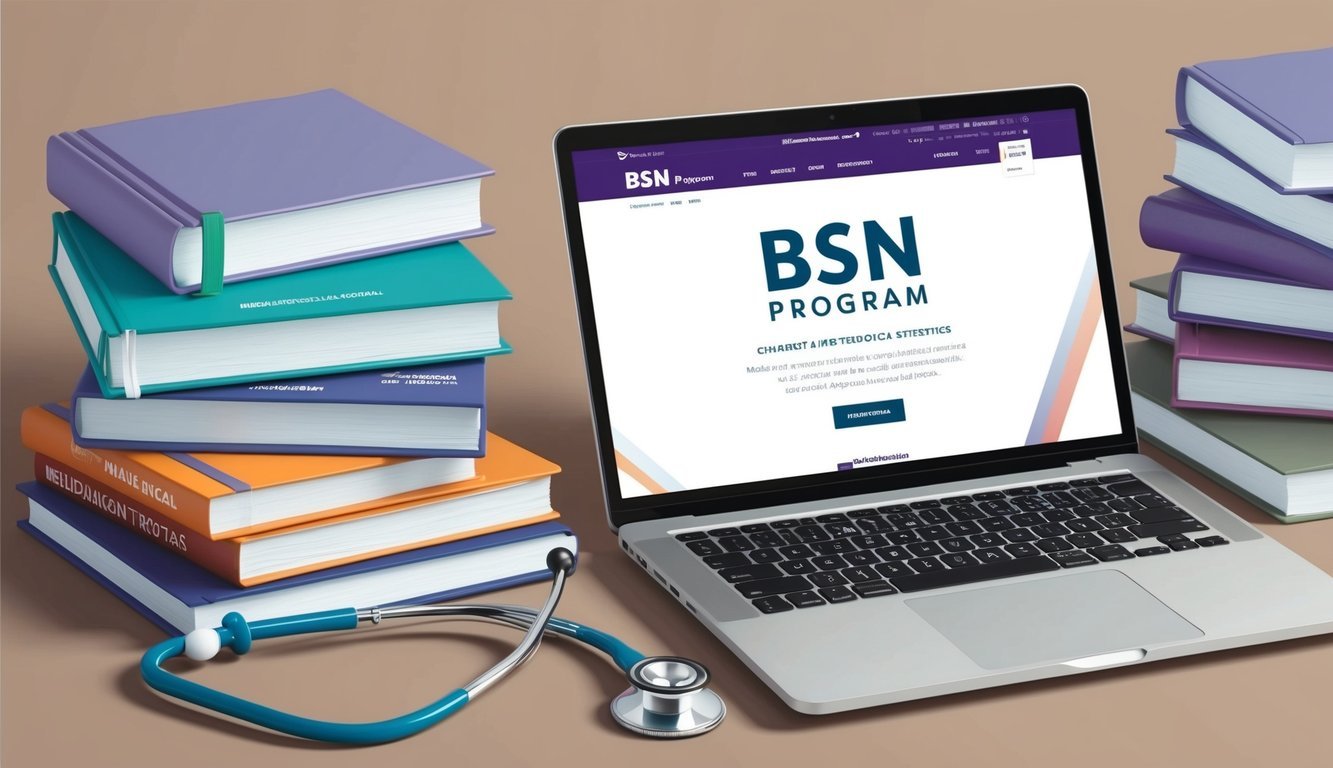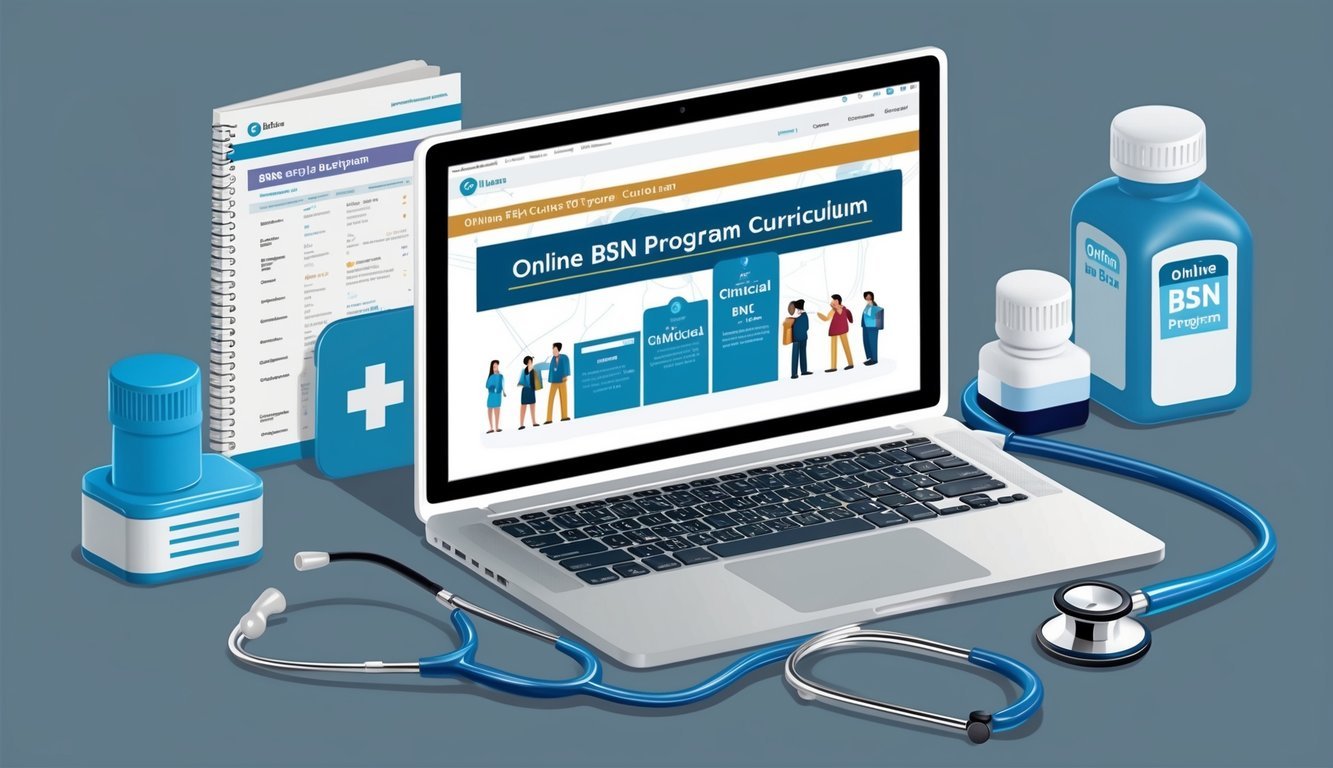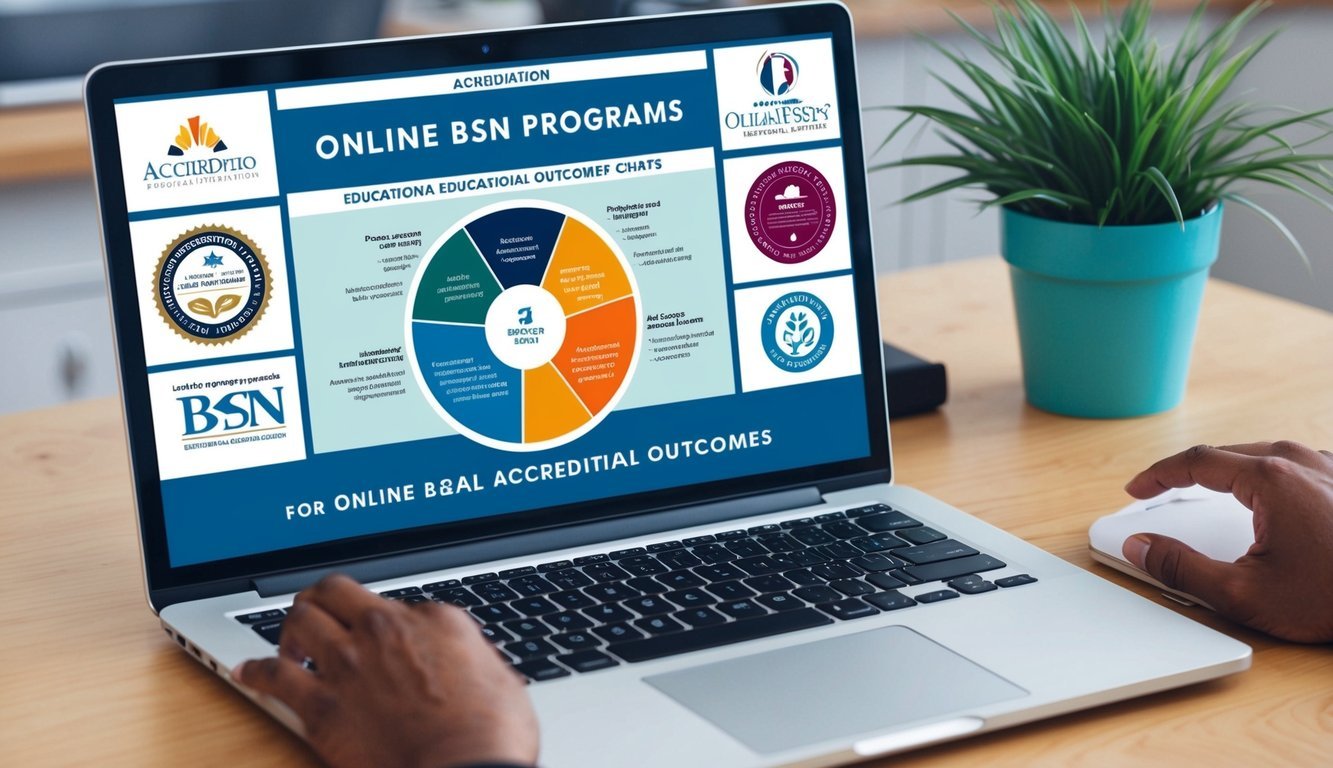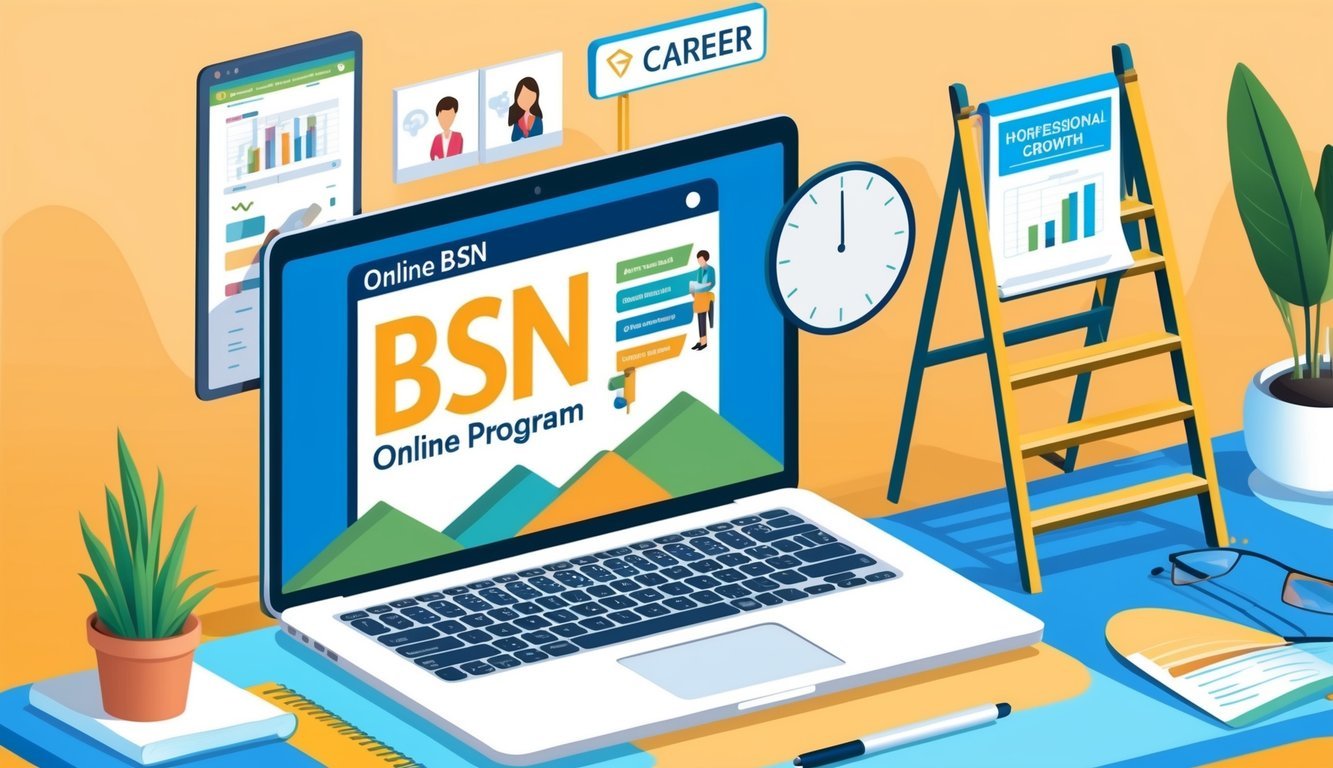If you’re considering a career in nursing but don’t have a background in the field, online BSN programs for non-nurses offer a flexible and efficient path to your goal.
These programs are tailored for individuals with a bachelor’s degree in another discipline, allowing you to fast-track your nursing education while balancing other life commitments.
Many institutions now provide accelerated options that can help you earn your Bachelor of Science in Nursing (BSN) within a year, equipping you with the skills needed to succeed.
The combination of online coursework and in-person clinical experiences means you can gain the necessary knowledge without disrupting your current schedule.
Programs like those offered by Baylor University’s Accelerated BSN allow you to immerse yourself in both theoretical and practical aspects of nursing.
Another example is the University of Rochester, where you can complete a comprehensive 12-month ABSN curriculum designed specifically for non-nurses.
Taking this transformative step not only paves the way for a rewarding nursing career but also enables you to make a significant impact in healthcare.
The growing demand for qualified nurses highlights the value of pursuing an online BSN.
Embracing this opportunity can lead you toward a fulfilling future in nursing.
Overview of Online BSN Programs

Online BSN programs offer a flexible pathway for individuals seeking a Bachelor of Science in Nursing (BSN) without traditional classroom constraints.
These programs utilize innovative online coursework combined with essential in-person clinical experiences, making them suitable for non-nurses transitioning to nursing practice.
Key Features of Online BSN Programs
Online BSN programs typically include core elements that support your educational journey:
- Curriculum Structure: Courses cover nursing theory, clinical skills, and patient care. You’ll learn about nursing ethics, healthcare policies, and specialized nursing practices.
- Flexible Scheduling: Offering asynchronous classes, these programs allow you to learn at your pace, balancing work or other commitments.
- In-Person Requirements: Most programs mandate clinical rotations. You’ll gain hands-on experience in healthcare settings, ensuring practical skill development.
- Support Services: Many institutions provide academic advising, tutoring, and career services to assist you throughout your education.
These key features enhance your online nursing education experience, preparing you for successful nursing practice.
Benefits of Pursuing a BSN Online
Choosing to pursue an online BSN brings several distinct advantages:
- Access to Diverse Programs: You can select from a variety of accredited online nursing programs tailored for non-nurses, such as those highlighted in resources like ABSN.org.
- Career Advancement: A BSN is increasingly required for many nursing positions. Graduating from an online nursing program can expand your opportunities and earning potential.
- Distance Learning: You can study from anywhere, which makes it easier to fit education into your busy life.
- Cost Efficiency: Many online programs are competitively priced, allowing you to save on commuting and accommodation costs.
With these benefits, an online BSN can be a strategic move toward a fulfilling nursing career.
Admissions and Academic Requirements
When considering an online Bachelor of Science in Nursing (BSN) program, understanding the admissions and academic requirements is crucial.
Each program may have specific criteria, but there are common elements that you will encounter across many institutions.
Navigating Admission Requirements
Admission requirements can vary significantly from one program to another.
Generally, you will need to possess an undergraduate degree from an accredited institution.
A minimum GPA, often around 3.0, is typically required.
Other common requirements include:
- Completed application form
- Official transcripts from all previously attended institutions
- Personal statement or essays outlining your motivation for pursuing nursing
Some programs may require professional references or letters of recommendation.
Ensure that you thoroughly review the specific requirements for each online BSN program you apply to.
Understanding Prerequisite Coursework
Before enrolling in an online BSN program, you may need to complete certain prerequisite courses.
These courses provide a foundation in essential subjects necessary for nursing.
Common prerequisites include:
- Anatomy and Physiology
- Microbiology
- Chemistry
- Psychology
Checking with your chosen program regarding specific coursework can help you stay on track.
Some programs may accept transfer credits for completed courses, potentially shortening your path to graduation.
Examination Criteria: TEAS Exam and Others
Many nursing programs require you to take standardized entrance exams as part of the admissions process.
One of the most common is the Test of Essential Academic Skills (TEAS) exam, which assesses your reading, mathematics, science, and English skills.
Preparing for the TEAS exam can be crucial, as your scores may significantly influence your admission status.
Some schools may also accept alternative exams, such as the HESI A2 or NLN PAX.
Be sure to review the specific testing requirements before applying to your desired program.
Curriculum and Clinical Components

The curriculum of online BSN programs for non-nurses is designed to provide you with a comprehensive understanding of nursing principles, essential skills, and clinical experience.
Each component plays a crucial role in preparing you for a career in nursing.
Nursing Coursework Overview
The coursework in online BSN programs typically includes core subjects such as health assessment, nursing fundamentals, and advanced clinical practices.
You will engage in both theoretical and practical learning, which helps you master essential nursing skills.
Key Courses:
- Health Assessment: Focuses on techniques for conducting patient assessments.
- Clinical Nursing Skills: Covers essential technical skills and procedures.
- Pathophysiology: Explores disease processes affecting patients.
These courses are designed to be rigorous, ensuring you develop a solid foundation in nursing knowledge.
Programs integrate simulations and case studies, allowing you to apply your learning in real-world scenarios.
Clinical Experiences and Rotations
Clinical experiences are a significant aspect of your nursing education.
Online BSN programs typically require a set number of clinical hours, offering you the opportunity to work alongside experienced nurses.
Clinical Rotation Components:
- Acute Care Settings: Experience in hospitals, where you engage with patients facing various medical conditions.
- Community Health: Focus on preventive care and health education in community settings.
- Specialty Areas: Rotate through areas such as pediatrics, geriatrics, and mental health.
These rotations are crucial for gaining hands-on experience and understanding patient care dynamics.
Your program will arrange clinical placements in healthcare facilities near you, facilitating practical learning and skill development.
Integrating Evidence-Based Practice
Evidence-based practice (EBP) is fundamental to nursing education.
You will learn to assess and apply research findings to clinical practice, ensuring you deliver optimal patient care.
Key Aspects of EBP:
- Research Literacy: Understand how to analyze and interpret nursing research.
- Application of Findings: Learn to translate research into practice, improving patient outcomes.
- Quality Improvement: Develop skills to evaluate and enhance care practices based on evidence.
Incorporating EBP into your training empowers you to make informed decisions and provide high-quality care.
This integration prepares you to be a critical thinker and effective caregiver in various healthcare settings.
Accreditation and Educational Outcomes

Accreditation is vital for ensuring quality education in online BSN programs.
It affects your eligibility for licensure and employment.
Understanding what accreditation means and how it relates to your educational outcomes is crucial as you navigate your nursing education.
Ensuring Program Accreditation
When choosing an online BSN program, confirm that it has the appropriate accreditation.
The main accrediting bodies for nursing programs include:
| Accrediting Body | Description |
|---|---|
| Commission on Collegiate Nursing Education (CCNE) | Focused on baccalaureate and graduate programs. |
| Accreditation Commission for Education in Nursing (ACEN) | Covers all levels of nursing education. |
Accredited programs meet specific standards that ensure quality education.
Enrollment in an accredited program often makes you eligible for federal financial aid.
Furthermore, nursing programs that fail to maintain accreditation may impact your ability to sit for the NCLEX-RN, the exam required for licensure.
Pathway to Nursing Licensure
Completing an accredited online BSN program supports your pathway to becoming a registered nurse.
After graduation, you must pass the National Council Licensure Examination for Registered Nurses (NCLEX-RN).
This exam evaluates your readiness for safe and effective practice.
To qualify for the NCLEX-RN, you should ensure that your program’s curriculum covers essential topics such as:
- Nursing fundamentals
- Pharmacology
- Health assessment
Most states require proof of a completed accredited program to apply for licensure.
Be diligent in verifying that your chosen program prepares you for both the educational and licensure requirements in your state.
Career Advancement and Professional Growth

Pursuing an online BSN program creates various pathways for career advancement and professional growth.
With the constantly evolving healthcare landscape, you have the opportunity to enhance your qualifications and take on significant roles within the nursing field.
Opportunities for Registered Nurses
The demand for registered nurses (RNs) continues to grow, opening doors for various career opportunities.
By obtaining a BSN, you position yourself for roles that require advanced education and skills.
| Role | Description | Salary Range |
|---|---|---|
| Nurse Manager | Oversees nursing staff and operations | $70,000 – $100,000 |
| Clinical Nurse Specialist | Provides expert advice in a specialized area | $85,000 – $115,000 |
| Nurse Educator | Teaches future nurses and conducts research | $65,000 – $95,000 |
These roles not only offer competitive salaries but also provide opportunities for leadership and mentorship within healthcare settings.
Obtaining your BSN can significantly enhance your employability and prepare you for future growth.
Exploring Advanced Nursing Roles
With a BSN, you can explore advanced nursing roles such as Nurse Practitioner (NP) or positions in healthcare administration.
NPs have the ability to diagnose and treat patients independently, leading to increased responsibilities and autonomy.
- Nurse Practitioner: Focuses on patient care, often specializing in areas such as pediatrics, geriatrics, or family health.
- Healthcare Administration: Manages healthcare facilities or departments, emphasizing efficiency and quality in patient care.
Both roles see a rising demand due to the aging population and evolving healthcare needs.
Transitioning into these positions can significantly enhance your career trajectory.
It allows you to impact patient care positively and contribute to healthcare innovation.
Explore more about advanced nursing roles for detailed insights.

